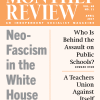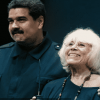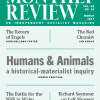
Trump’s America
With the rise of Donald Trump, U.S. politics has descended, like never before, into a theater of the absurd. Unbridled anti-intellectualism, deception, and “vindictive chaos” recall a morally reprehensible past in the guise of “making America great again.” But despite his populist posturing, Trump’s contempt for democratic processes is matched by his commitment to economic policies that favor the financial elite. | more…

Nature, Labor, and the Rise of Capitalism
Capitalism was a radical break with the past: for the first time, production of basic goods was driven by the accumulation of wealth for its own sake, and not primarily to satisfy human needs. Likewise, we are alienated from the natural world, as the products of our own labor are no longer under our control. Our very perception of nature is shaped by an economic system that treats “the environment” as a collection of commodities to be exploited. | more…

A Radical Invitation for Latin America
Admired, followed, criticized, denounced, and rediscovered, “The Development of Underdevelopment” deserves a place among the key documents of postwar radical political economy. More than fifty years on, its ideas still illuminate aspects of recent struggles and shortcomings among left-of-center governments in Latin America. Most importantly, Frank’s work poses a bold postcolonial challenge that has yet to be fully met by Latin American scholars and social movements. | more…

Singing for Women’s Lives in Chile
In an idyllic canyon near Santiago, a group of twelve women were electric with emotion from sharing personal stories and experiences, and, of course, from singing. Deep bonds were forged among participants, few of whom knew each other prior to the workshop. They were there to compose women-identified songs in a setting that alternated between individual and group composition. | more…

April 2017 (Volume 68, Number 11)
One would think that with such an anti-worker president, the U.S. labor movement would be primed to do all in its power to mobilize union members to resist, much as millions of people have protested Trump since the day he took office. But such has not been the case. | more…

Neofascism in the White House
Not only a new administration, but a new ideology has now taken up residence at the White House: neofascism. It resembles in certain ways the classical fascism of Italy and Germany in the 1920s and ’30s, but with historically distinct features specific to the political economy and culture of the United States in the opening decades of the twenty-first century. | more…

Who Is Behind the Assault on Public Schools?
While the political conflicts and social ramifications of public school reform are well known, basic questions about the movement remain underexamined. Who really leads it? What are their motives? We need a deeper understanding of this movement, its drivers, and its underlying aims. | more…

A Teachers Union Against Itself
How did a community college that had managed to serve and retain most of its student population and remain fiscally sound amid a recession and a budget crisis become the target of condemnation by accrediting authorities? The answer involves a disastrous collision of corporate education reform, administrative arrogance, and timid, undemocratic union leadership. | more…

‘A New Revolutionary Subject’
[wcm_nonmember]
[/wcm_nonmember] Although today there are some setbacks in the region, nobody can deny that there is a huge difference between the Latin America that Hugo Chávez inherited and the Latin America he left us. A new revolutionary subject has been created. | more…

March 2017 (Volume 68, Number 10)
U.S. economic, military, and financial dominance have been ebbing for decades, leaving the United States in the position of a wounded mastodon within the world at large, a threat to all around it. Washington has repeatedly tried with very limited success to reverse this slide in its hegemonic role by means of geopolitical expansion, aimed at increasing its “strategic assets” across the globe. The result has been a constantly expanding theatre of global conflict. | more…

Organisms and Objectifications
The anthropocentric tendency to view nature or the environment as everything that is not human obscures the productive processes that go on in “nature.” But non-human animals are also the purposeful producers of their own worlds: they too engage in their own species-specific objectifying activity that transforms what is, from their perspective, nature; they too build worlds in their own bodily image. | more…

‘Mourning and Militancy’
There is a degree of unpredictability in politics today that presents opportunities for those who aren’t too constrained by past experience to see them. We’re seeing the possibility of regenerating a left that has previously been ground down to the scale of atoms, one that, if it adapts creatively to the coming defeats, can prepare the ground for success. But that means recognizing that the history of the left is a history of defeats; it is a history of the vanquished. | more…
The Battle for the National Health Service
England and Wales represent two very different, indeed incompatible, approaches to health care. In the former, health care has come under increasing threat from the predatory forces of privatization. In Wales, however, an explicit effort has been made to defend socialist values and formulate them for the twenty-first century, defending and expanding a system that puts the health and well-being of its citizens over profit. | more…